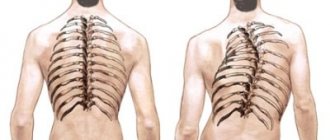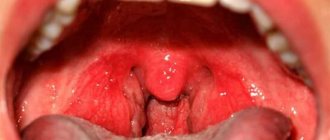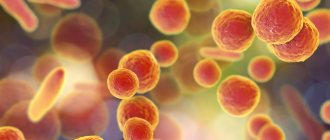Dysbacteriosis in children is a very common phenomenon. It can be caused by the introduction of complementary foods, unfavorable ecology and other reasons.
The intestines of every person are inhabited by many bacteria. Being in a certain ratio, they ensure the normal functioning of the body. Bifidobacteria and lactobacilli protect the internal environment of a person from the penetration of harmful microbes and toxins, promote the formation of immunity, that is, they put a barrier against any external aggression.
Bifidobacteria and lactobacilli, Escherichia coli normally make up the majority of the microflora, but it also includes opportunistic microflora (Klebsiella, Staphylococcus, Enterococcus, Proteus), which, under the influence of unfavorable factors (stress, trauma, decreased immunity) can provoke the occurrence of diseases.
Pathogenic flora (so-called pathogenic) can also enter the body. Normally, it is not in the intestines, and when such microorganisms get there they also cause diseases (intestinal infections).
About the disease
Dysbacteriosis is not a separate disease.
This is a pathological syndrome that occurs against the background of primary pathologies of internal organs or the influence of provoking factors, accompanied by an increase in the number of harmful bacteria in the baby’s intestines. Because of this, digestion worsens and the patient’s general well-being is disrupted. It is worth noting that the term “dysbiosis” appears separately in the literature. Dysbiosis is a problem caused by an imbalance of exclusively bacterial flora, when dysbiosis is a violation of the relationship between all microorganisms (bacteria, fungi, and sometimes viruses).
Newborns and infants are the widest risk group for intestinal microflora disorders. The reason is the immaturity of the intestines, which is gradually filled with both beneficial and harmful bacteria.
There are transient (up to 7 days after birth) and true dysbiosis (after 7 days) in a child. And therefore, in 70-80% of cases, parents should not panic. With adequate care for the baby and treatment (if necessary), the signs of internal imbalance disappear quite quickly.
Provoking factors for the development of dysbiosis
The most common factor in imbalance is previous infections, and not only intestinal ones.
Otherwise, we ourselves very successfully destroy it or initially set the wrong vector for the formation of relationships with microorganisms through our actions: by excessively actively using antibiotics
- early transfer to artificial feeding
- often resorting to surgical delivery.
- Stress, increased physical and psycho-emotional stress, smoking, alcohol abuse or illegal substances are practically not encountered in early childhood.
Symptoms of dysbiosis
Dysbacteriosis is a problem that in 90% of cases affects the child’s intestines. Accordingly, the entire clinical picture is justified by dysfunction of the gastrointestinal tract with an increase in symptoms of dyspepsia. The most common signs of bacterial imbalance are:
- foamy stool - stool acquires an unpleasant sour smell and becomes more liquid;
- abdominal pain like colic;
- constant pulling of the legs towards the tummy in order to reduce the severity of pain;
- emotional lability, moodiness, constant crying, poor sleep;
- regurgitation of air or food debris;
- vomiting (appears in severe cases);
- increased gas formation in the intestines (flatulence),
- bowel dysfunction such as constipation or diarrhea;
- various forms of allergic reactions - dermatitis, itching, skin rash.
The severity of the clinical picture largely depends on the specific pathogen that is most active in the intestine.
Symptoms are also determined by the state of the little patient’s immune system and the nature of feeding. If the above signs are detected, parents should contact their pediatrician. The doctor will be able to assess the child’s condition and rule out more serious pathologies. If necessary, the specialist will prescribe adequate treatment.
The health of the children of the Southern Urals is our concern!
Dysbacteriosis has recently become a very common condition in children, especially in infants. It causes discomfort to babies, worsening their general condition and well-being, interferes with the child’s normal weight gain and causes a lot of worry to their parents. In addition, microflora plays an important role in human life. It regulates intestinal motility, supports and stimulates the immune system, synthesizes many vitamins, provides antiviral protection for the host, normalizes metabolic processes, helps absorb many trace elements and amino acids, helps cleanse the body of toxins and prevents the penetration of foreign microbes into the blood. In total, in the human body in the intestines there are 1.5 kilograms of beneficial microbes in dried form - this is a whole “organ”. Their activity and significance can be compared with the function of the two organs of the liver and kidneys combined! The head of the pediatric gastroenterology department of the Chelyabinsk Regional Children's Clinical Hospital, a doctor of the highest category, Vadim Zemlyakov, talks about the causes of dysbiosis and methods of combating it.
— Vadim Leonidovich, some doctors consider dysbiosis to be a disease. What is your opinion on this matter? — Dysbacteriosis is a condition that can develop due to various diseases or unfavorable environmental conditions of a person. Let me give you a simple example: you are sitting at a lecture or in a movie, and the amount of carbon dioxide in the air is stuffily increasing in the hall. In this situation, a state of dysbiosis gradually begins to develop. The boss scolded him at work, the person received a new portion of stress, intestinal motility increased, and the beginning of the development of a state of dysbiosis was laid. The normal intestinal flora, and not only the intestinal flora, but also the flora of all abdominal organs, is affected by: poor nutrition, poor ecology, climate change, various ionizing radiation that surrounds a person in everyday life, inflammatory diseases, and taking medications. But this is not a disease - it is a change in flora (temporary condition) depending on external conditions of influence. — Can dysbiosis occur only in the intestines or is all mucous membranes of the body susceptible to this? — Disturbed intestinal flora will have a negative effect on the mucous membrane of all abdominal organs in which it is present (oral cavity, esophagus, stomach, intestines, vagina, etc.). Here a chain of relationships appears: disease of the intestinal mucosa affects the state of the microflora, disturbed microflora affects the mucous membrane. — By what signs can parents determine that their child has a dysbacteriosis condition? — Parents should think about it if their child’s appetite decreases, the child is pale with bluish circles under the eyes and under the nose. If a child periodically experiences nausea, grumbling and abdominal pain, the stool changes, and there are greens or pieces of undigested food in the stool. The child does not gain weight well, spits up, and often begins to get colds. Perhaps in the evening, namely at seven o'clock, a low-grade fever is noted - 37.1-37.2. Provided that you hold the mercury glass (and not electronic) thermometer for exactly 10 minutes, this is very important. These signs may indicate diseases of the digestive system and, in particular, the condition of dysbiosis. — How much does the state of the intestinal flora affect the child’s immunity? — When a child’s intestinal microflora changes for the worse, immunity decreases. When a child develops frequent colds, this also indicates that the digestive organs do not allow one to have 100% immunity. After all, 98% of a person’s immunity depends on the state of the colon microflora. And when it is disrupted, immunity drops, which means frequent colds appear. — That is, if parents have a child who is often sick, they should think about visiting a gastroenterologist? - Like one of the moments. We know that many diseases: skin, teeth, mucous membranes, even bronchial asthma, are sometimes a complication of diseases of the digestive system. When people ask me questions like this, I immediately remember one incident: the entertainer comes on stage and says: “I have a headache today.” His partner replies: “You probably ate something wrong.” The audience in the hall laughs, but he said everything correctly. Headache can be a direct consequence of gastrointestinal problems. — How does a doctor determine whether a child has a dysbacteriosis condition? — There are various methods for studying microbial flora in humans. When assessing a stool test for dysbacteriosis, it is very important to take into account the patient’s age, the principles of his diet, the sowing period: how it was collected, and when the stool was donated. And without taking these factors into account, it is impossible to correctly evaluate the result obtained. Because the numbers will ultimately be different. Let me give you a simple example: if a patient consumes more fermented milk products, then he will have significantly less coli bacteria, but this does not mean that this is a disease. If he eats more meat, he will have more coli bacteria, less bifidum, and so on. Therefore, the analysis itself must be interpreted taking into account all these points. — When a child is tested, are all these factors examined in detail? - Of course not. — Then it turns out that it is impossible to accurately determine the presence of dysbacteriosis in a child? — Without taking these factors into account, it is impossible. Therefore, many parents, when they turn to us for help, are often surprised why we ask all the subtleties and details of nutrition, which, in principle, no one ever asks. Therefore, we differ positively both in terms of treatment, and in terms of diagnosis, and in terms of results. And that’s why there’s always a huge queue for us. — What methods of treating dysbiosis exist and is it necessary to treat it at all? - You definitely need to treat! It is necessary to begin treatment with the underlying disease that led to this condition or with the cause that led to it. Naturally, medications are initially prescribed that act directly on eliminating the underlying cause. Let’s assume that a child has gastritis, it is treated, and drugs are prescribed that improve the child’s intestinal microflora. If the child is in rooms where there are various household “emitting devices” (TV, computer, microwave oven, radiotelephone, etc.), then, accordingly, they must be used as rarely as possible. If medications are a factor leading to the disease (antibiotics, etc.), then, if possible, they should be replaced or eliminated completely. That is, it is first necessary to remove factors that negatively affect the normal intestinal flora of the child. And only after that, it becomes possible to restore it. - The doctor will be able to determine exactly why it is dysbiosis that has developed? - Most often, we see the reason. - Is there a way to prevent dysbiosis? - First of all, it is necessary to monitor the child’s health. It is imperative to adhere to the principles of a healthy diet. The child’s daily diet should contain plant fiber (vegetables, fruits, grains) porridge), which helps restore intestinal microflora. Naturally, the set should be complete: microelements, vitamins, enzymes. Plant foods should predominate in the diet; the child must consume fermented milk products and proteins, in the form of eggs, meat, chicken, and fish. This will help restore normal intestinal flora. — You can lead a healthy lifestyle, but it’s much more difficult to protect yourself from stress and radiation. What is the solution in this case? — The only thing is to get rid of the source of negativity. If, for example, you are stressed at work, then you need to change your place of work. And this is absolutely serious, because we only live once. Being under constant stress and being treated for illnesses is not the best solution to the problem. It just doesn't make sense. It’s not for nothing that the Japanese believe that you should change your job once every five years. And at each enterprise they have an unloading room in which there are models of bosses. If the boss offends you, you go into this room and use the stick there to hit this dummy. The boss whose dummy is destroyed faster than others is fired from the enterprise. This is the prevention of illness among employees and the struggle for higher productivity in the enterprise. — It turns out that it is also not rational to live in the Chelyabinsk region, where the ecology is not the best? — Of course, living near the Mediterranean Sea or in the mountains of Georgia is much more useful than living in the Chelyabinsk region. Let me give you a simple example: in 1991, through the Green Cross, we took children with gastroenterological pathologies to Karlovy Vary for recovery. I took with me a huge box of medicines in case of exacerbation of illnesses, because every child had a serious digestive disease. And after living there for 1.5 months, none of the children complained of feeling unwell. But as soon as we crossed Brest and went to a restaurant on the train, within exactly two days that we were traveling, all the medicines we had stored were used up. Children began to have health problems due to deteriorating quality of food, water and air. — What is the role of heredity in the development of gastrointestinal diseases? — Of course, the health of his parents plays a big role in the health of a child. They convey to him a predisposition to diseases of the digestive system. If the mother is unhealthy, then the quality of her breast milk will be low, which is the next factor not in favor of the baby. — During breastfeeding, should the mother follow a special diet or diet? — Nutrition should be complete and varied. If the mother has gastrointestinal diseases, medications that improve her condition can be prescribed for preventive purposes. The mother herself should draw the attention of the gynecologist to this, because her state of health at the time of the birth of the child plays a big role in shaping the health of the baby. In particular, how complete the composition of his intestinal microflora will be. After all, the colonization of normal microbes in the baby’s intestines occurs in the womb, starting at 26-28 weeks. — What foods are not recommended for children to eat? — There are five main unhealthy foods: carbonated drinks, mayonnaise, ketchup, chips and chewing gum. These are all products of genetic engineering. For example, long-term use of chewing gum leads to dementia (the presence of phenols in it). Moreover, it is coated with a harmful taste-forming substance. And its frequent use leads to disruption of the food reflex. And the next time you swallow food, your stomach will not be ready to digest it. — What foods are best not given until the age of three? — All products up to three years old must be natural, not canned! They can be used raw or cooked. Fried and smoked, pickled, chocolate, of course, are not allowed. Although recently we have to talk about bad habits in young children, when mothers start giving their babies a teaspoon of vodka at night so that they sleep better. And for the sake of appetite, children began to be given beer. This has been happening quite often lately. We receive young children with cirrhosis of the liver because the mother, while breastfeeding the child, drank alcoholic beverages and smoked. — How do you feel about the use of milk in children’s diets? “Given the fact that there are no ideally healthy children, drinking milk may not be beneficial for many of them. Milk can contribute to excessive growth of microflora, and sometimes the child’s body is not able to digest it (lactase deficiency). Therefore, we, gastroenterologists, are more in favor of consuming fermented milk products and cheeses. — If a child is forced to take antibiotics, what should be done as a preventive measure to prevent dysbiosis from developing? — It is best to combine antibiotics with a decoction of herbs, such as yarrow, plantain, chamomile or oregano. They reduce the negative effects of antibiotics on the intestinal mucosa and its microflora by 80%. — How common are diseases of the digestive system? — Diseases of the gastrointestinal tract in children are in second place after respiratory infections. And this is considering that a child suffers from ARVI 2-3 times a year, and the diagnosis of gastrointestinal disease is made once. — Do you treat children only from the region or from Chelyabinsk too? — CHODKB serves residents of the Chelyabinsk region, regardless of its territories, that is, Chelyabinsk is also included here. But given the fact that in Chelyabinsk there are a sufficient number of gastroenterological beds and specialists, diagnostics are also at a high level, we try to take only the most severe and complex cases from Chelyabinsk. And the last stage, if we are no longer able to provide assistance, the Institute of Pediatrics in Moscow takes care of patients. — How do children get to you? “They come on the referral of doctors from the region for a consultation at the regional children’s clinic with a gastroenterologist. After examining the child and conducting the necessary research, the doctor decides whether he needs to be hospitalized or treated on an outpatient basis. The second option for a patient to arrive at a regional children’s clinic or for hospitalization in a department is to be examined by a gastroenterologist at a “travel clinic.” This is when our specialists advise children at their place of residence.
Olga Melchakova, Uralpress news agency
Causes of dysbiosis
The pathogenetic basis for the development of dysbiosis is an imbalance between opportunistic and beneficial bacteria in the intestines.
Factors that provoke the occurrence of the corresponding problem are:
- Prematurity. In this case, the child’s intestines require more time to complete their formation and colonize with the correct microflora.
- The newborn stays too long apart from the mother. Normally, the baby is placed on the woman’s stomach immediately after birth in order to exchange “native” microflora. However, with various complications, a small patient may be taken to an incubator or intensive care unit, which does not contribute to the normal colonization of beneficial bacteria.
- Artificial feeding. Formulas can imitate mother's breast milk, but they cannot replace it 100%, which increases the risk of developing dysbiosis.
- Taking antibiotics. Antibacterial agents kill not only pathogenic microorganisms, but also beneficial ones.
- Infectious diseases. The inflammatory process is accompanied by disruption of the microflora and damage to the intestinal mucosa.
- Primary or secondary decrease in immunity (exacerbation of chronic somatic diseases).
The more factors simultaneously influence the patient’s body, the higher the chance of developing dysbiosis.
How to support natural microflora
Drops for oral administration – Acipol® Malysh, drops can help maintain the natural intestinal microflora. They belong to biologically active additives, which include the required amount of colony-forming organisms - lactobacilli, bifidobacteria.
The method of dispensing the product is very simple - there is a dispenser attachment. There is no need to dilute the substance; it is available in suspension. According to the instructions for use, Acipol® Baby, drops are given to the child once a day, 5 drops, it can be added to the mixture with water.
Diagnosis of dysbacteriosis
“SM-Doctor” is a modern medical center whose specialists quickly identify dysbacteriosis and any of its manifestations. Thanks to our own laboratory and the latest equipment, our doctors accurately determine the cause of the problem and select the best methods to solve it. After collecting anamnesis and a thorough analysis of the patient’s complaints, the pediatrician examines the little patient. During palpation, bloating and tenderness of the anterior abdominal wall may be noted. To confirm the diagnosis, the doctor prescribes additional tests:
- microscopic examination of stool;
- bacteriological examination of stool;
- a set of traditional laboratory tests to assess the general level of health (blood and urine tests, “blood biochemistry”).
If the doctor believes that dysbiosis in a patient is a consequence of an exacerbation of some other disease, the child is additionally referred for consultation to related specialists (cardiologist, gastroenterologist, neurologist, infectious disease specialist, etc.).
Good and bad bacteria
The baby begins to behave restlessly
But in the kingdom of the intestinal microorganism, unfortunately, not only the composition of beneficial bacteria has entered, such as: bifidobacteria, lactobacilli, E. coli, bacteriodes - both neutral and harmful inhabitants have joined here.
The life of neutral bacteria such as peptostreptococci, clostridia, staphylococci, proteus, klebsiel, veillonella, does not give the body either good or bad. And “bad” microorganisms cause significant harm. And the happy time when the baby is just born and he and his mother spend time at home can be overshadowed by his unexpected deterioration in health.
An important problem that always worries parents of a newborn is the state of its digestive organs. When the baby begins to behave restlessly, he develops intestinal colic, constipation, hypovitaminosis, then the parents begin to sound the alarm. And it is right. Because such manifestations are similar to dysbiosis.
Treatment of dysbiosis
Dysbacteriosis is a pathological condition that does not pose a critical threat to the child’s health, but can seriously worsen his well-being.
Proper care of the baby and adequate treatment contribute to the rapid normalization of the patient’s condition. For this purpose, the following methods and drugs can be used:
- Regular feeding of the child. Breast milk is optimal, and in its absence, adapted artificial formulas.
- Probiotics are drugs that help restore the normal number of beneficial microorganisms in the intestines.
- Prebiotics are substances that stimulate the growth of your own colonies of beneficial bacteria.
- Sorbents. In case of serious digestive disorders, the use of enterosorbents is indicated to bind undigested food particles. They neutralize toxins found in the intestinal lumen and remove them from the body.
If you follow the doctor's recommendations, the problem can be eliminated within a few weeks. The main thing is not to ignore clinical symptoms, but to contact a pediatrician in a timely manner.
What to do in case of dysbiosis in children?
Correction of intestinal dysbiosis in children is aimed at eliminating the cause and symptoms of the disorder. Women who want to know how to help their baby with colic and gas should read the advice of a doctor. Often the specialist prescribes:
- bacteriophages;
- oral sorbents;
- enzymatic agents;
- carminatives;
- prescribe probiotics for babies to populate the microflora, or prebiotics to stimulate the growth of their own colonies;
- sometimes an antibiotic;
- taking interferons.
To correct dysbiosis, walks in the fresh air, supplementing the diet with probiotic products and normalizing the sleep and rest patterns of children are also recommended.
Prevention of dysbacteriosis
The following measures help reduce the likelihood of developing dysbiosis:
- skin-to-skin contact immediately after birth;
- rational nutrition of the child - ideally breastfeeding and no supplementary feeding before the due date;
- washing hands before eating.
"SM-Doctor" is a modern medical center with wide diagnostic and therapeutic capabilities. We follow the example of leading clinics in Europe and the world and do everything necessary to improve the baby’s well-being in the shortest possible time. Contact professionals at a convenient time!
About the importance of timely treatment
The intestinal microflora performs many important functions: it supports heat production in the body, regulates intestinal motility and ensures the absorption of nutrients, participates in the metabolic processes of proteins, fats, carbohydrates, and produces active substances. It also promotes detoxification processes and is involved in the regulation of the child’s behavioral reactions (appetite, sleep, mood). Therefore, it is important to pay attention to the typical symptoms of an imbalance of microorganisms and take timely measures. In the absence of corrective measures and treatment, dysbiosis can cause hypovitaminosis, behavioral disorders, the development of IBS (irritable bowel syndrome) and other consequences.
Prevention and correction of nutrition for nursing mothers to preserve the baby’s healthy microflora
The expectant mother needs to eat foods that contain a lot of fiber. Include culinary dishes made from bran and oatmeal in the daily menu. There are salads seasoned with vegetable oils. Apples, apricots, grapefruits, black currants.
Try to put the newborn baby to your breast as early as possible and breastfeed the baby naturally for a long time. Mothers should have a rational, balanced diet after childbirth. It is necessary to consume coarse fiber to stimulate peristalsis and for the development of beneficial microflora of the gastrointestinal tract. There are also bran, muesli, buckwheat and rice porridges, and wholemeal flour products. Consume fresh and raw vegetables and fruits, preferably grown in your native region, fermented milk and dairy products, meat, fish, poultry, eggs. And only 5% are sweets and fats.
It is very important to preserve microorganisms in the child’s gastrointestinal tract. They are responsible for lining the mucous membrane of internal organs, thereby creating obstacles for pathogenic bacteria. They control the process of digestion and absorption of food, monitor the absorption of micro and macro elements into the body.
If a child has normal microflora, then his immunity will be strong - with normal functioning of the body, immunocompetent cells are stimulated and the development of food allergies is prevented.
How does the disease manifest in children?
Dysbacteriosis in children occurs in the same way as in adults. First of all, diarrhea or constipation occurs (sometimes alternating between them). The intestines experience colic and bloating, belching and bad breath. After eating, there is a feeling of fullness in the stomach. Often the syndrome occurs in the form of thrush in the mouth and skin lesions. A lack of vitamins and nutrients in the body contributes to the formation of congestion in the corners of the mouth. Due to decreased immunity, furunculosis, acne, and hair loss may occur.








